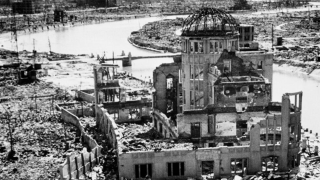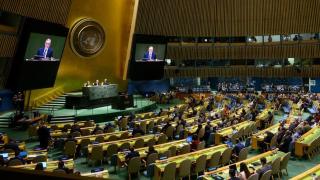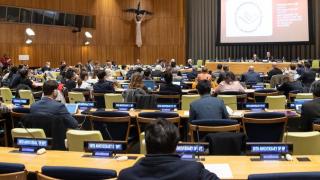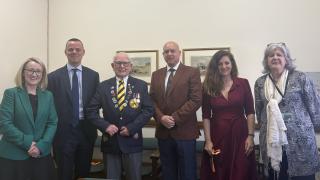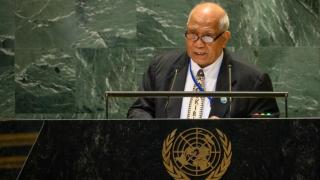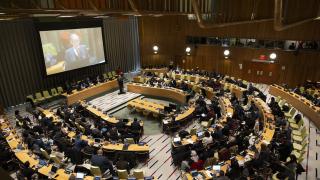
How the UK turns on civil society in a bid to avoid its nuclear weapons obligations
This story was originally published on Medium on July 29 2022 by Ben Donaldson, UNA-UK Head of Campaigns.
The UK boycotted two major Vienna conferences on nuclear weapons last month. The first was the Humanitarian Impacts of Nuclear Weapons conference (HINW) which included over 600 representatives of governments, international organisations, leading researchers, survivors, affected persons and civil society at the invitation of the Austrian Government. The second was the inaugural meeting of the parties to the Treaty on the Prohibition of Nuclear Weapons (1MSP) aimed at moving towards a world without nuclear weapons.
At HINW participants shared new research relating to the gendered impacts of radiation exposure, humanitarian assistance in the aftermath of a nuclear detonation, food security and analysis of nuclear risks. But the most powerful presentations were the testimonials of survivors of nuclear weapons use and testing.
UK diplomats missed out on hearing Sueichi Kido’s testimony of the Nagasaki blast. Kido was 5 when the bomb exploded, blowing him 20 metres through the air. He said “I will never forget the scenes in front of me that day, everything in the city seemed as if it had completely disappeared…I remember as I approached ground zero seeing bodies scattered all over the street, and people begging…’water, water, water’”. And they missed Danity Laukon from the Marshall Islands describe the impacts of nuclear testing on Pacific Islanders — a region the UK tested its own nuclear weapons — including the burns, forced displacement and high incidence of cancer suffered by Islanders.
Read UNA-UK and Article 36’s recent publication about the UK’s nuclear testing in the Pacific
The UK’s stated justification for not attending HINW was “strong concerns that some civil society organisations were co-opting the Vienna Conference on the Humanitarian Impact of Nuclear Weapons to press for unilateral disarmament, rather than the process outlined in the NPT. The UK therefore did not attend the Conference.”
Just let that sink in. The UK is openly admitting that it made a decision to boycott a high-level international conference on nuclear weapons hosted by an allied government based on the actions of “some civil society organisations” who were not even involved in organising the conference; indeed the charge is merely that these organisations portrayed the conference in a certain manner that the UK found disagreeable.
Taken at face value this shows staggering fragility from the FCDO; one would have thought British diplomats were made of sterner stuff or at the very least were more subtle about their insecurities. There can scarcely be a conference in history that hasn’t been misrepresented by one stakeholder or another, and it hardly speaks to the UK’s diplomatic ability if they’re unable to differentiate spin from substance. It would also constitute an own goal to react by boycotting a conference they otherwise would have attended.
However, it might be naive to take such a flimsy excuse at face value. What appears more likely, although the UK tries to avoid saying so out loud, is that this is the latest in a long line of deliberate but unacknowledged snubs to non-nuclear states and their concerns. Concerns which the recognised five Nuclear Weapons States (Britain, China, France, Russia and the US) have ignored for so long that the Non-Proliferation Treaty has been brought to its knees and the TPNW has emerged as the preeminent forum to pursue disarmament.
The UK is quick to portray its nuclear weapons as a force for good. A political tool, not a war-fighting tool. Maybe by shutting their ears to lived experience of the harm that nuclear weapons have caused and continue to cause, the UK is avoiding the uncomfortable truth that its argument doesn’t hold up.
Either way, the UK’s stated reason for swerving HINW is incredibly offensive to survivors and communities affected by testing. The conference included attendees from communities affected by the UK’s own nuclear weapons testing programmes in Australia, Kiribati and the United States.
Whether the UK’s justification is a scapegoat or not, I’ve worked in the sector for 10 years and have never experienced civil society being singled out like this. It signals an alarming new permissibility in the UK Government’s attitude towards targeting civil society — those with the least power and resources in the corridors of diplomacy. In this case, the UK chose to blame civil society rather than the Government whose conference they boycotted — or the host of states including close NATO allies who supported it and attended.
This fits a sinister slide in the UK, with civil society vilified and civic space under threat, as reported by CIVICUS Monitor. The increasingly restrictive legal and regulatory environment in the UK, in part due to the Lobbying Act and the Police, Crime, Sentencing and Courts Bill, makes it harder for civil society to campaign including through limits on the right to protest. Plans to further restrict human rights in the UK will make it harder still.
The UK’s attack on civil society comes hot on the heels of a French diplomat taking the incredible step of personally blaming a civil society leader for the outcome document of 1MSP — a document arrived at through the negotiations of 66 UN member states and supported that many again as well as the United Nations and the International Committee of the Red Cross. But yes, Philippe Errera, a senior official for France’s ministry of foreign affairs, singled out and blamed a solitary female civil society campaigner.
Authoritarianism in all its forms needs to be challenged. As attacks on civil society spread to the corridors of nuclear diplomacy, we need to recognise this dynamic and call it out. The UK frequently points to its embrace of civil society as a way to contrast its values from the closed, repressive approaches of China and Russia. Clearly these countries’ attacks on civil society are of a different magnitude to current conduct by the UK, but by making the difference one of scale and not of absolutes, the UK is telling the watching world that rather than making a different choice, it has made the same choice - it's just pursuing the agenda in a more subdued manner.
This article is one of two reflections on the recent Vienna conferences on nuclear weapons. The second (forthcoming) will look at 1MSP and in particular the opportunity for the UK to start engaging with State Party Kiribati on the victim assistance and environmental remediation elements of the Vienna Action Plan.
Read more
- Read UNA-UK and Article 36’s recent report
- UNA-UK urges UK Government to attend Vienna nuclear weapons meeting
Photo: Testimony by Danity Laukon from Marshall Islands at the HINW Conference (copyright ICAN Austria via twitter https://t.co/qC0CVZfqXw).

